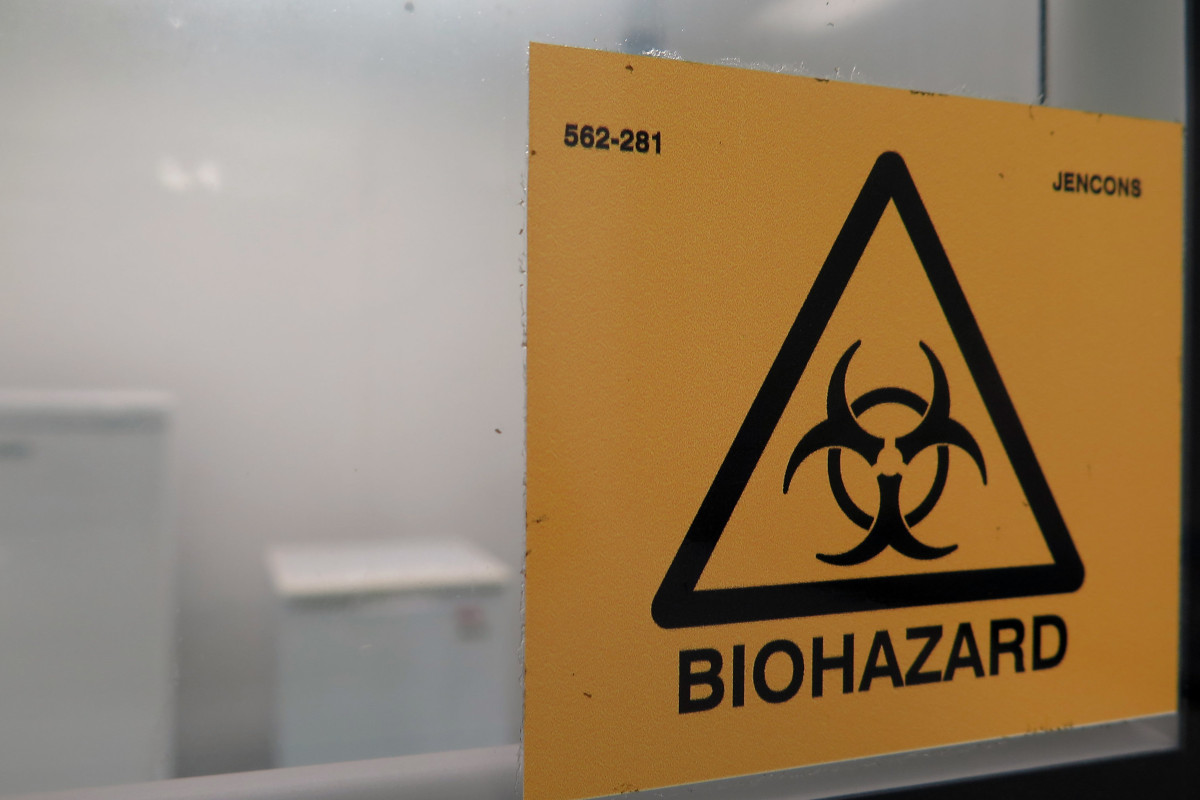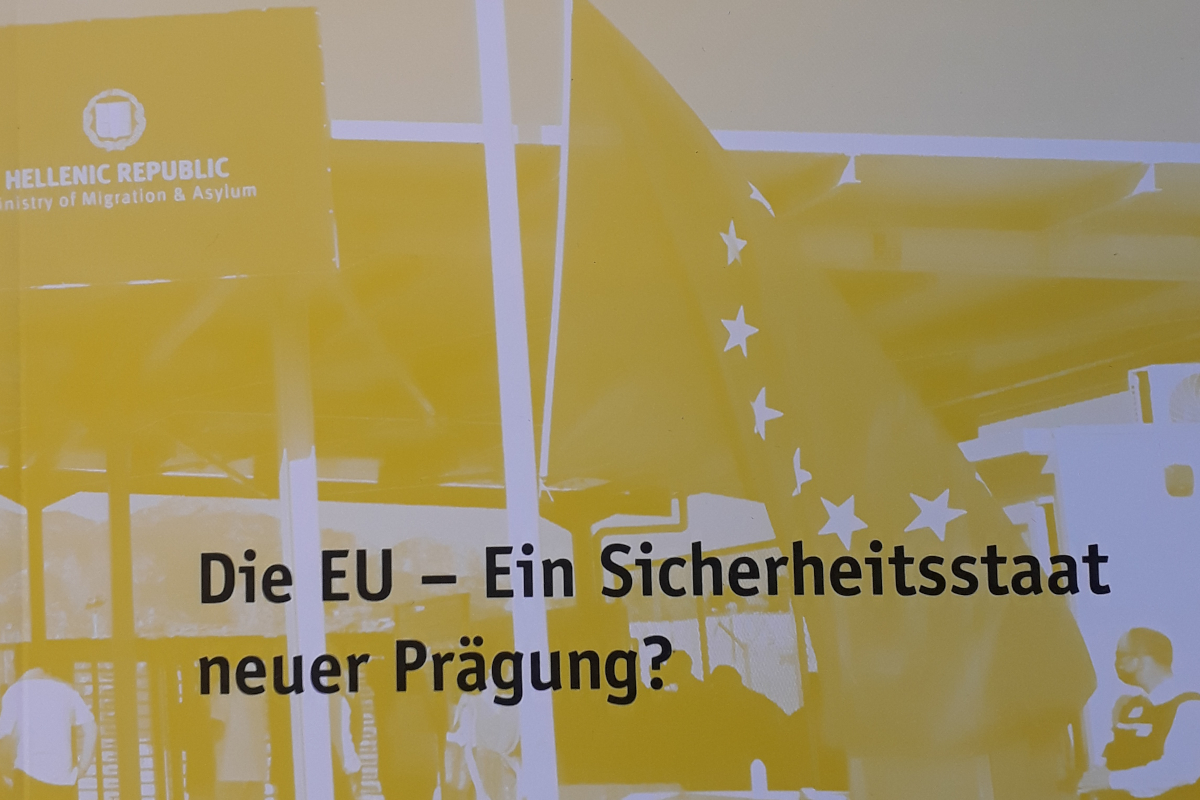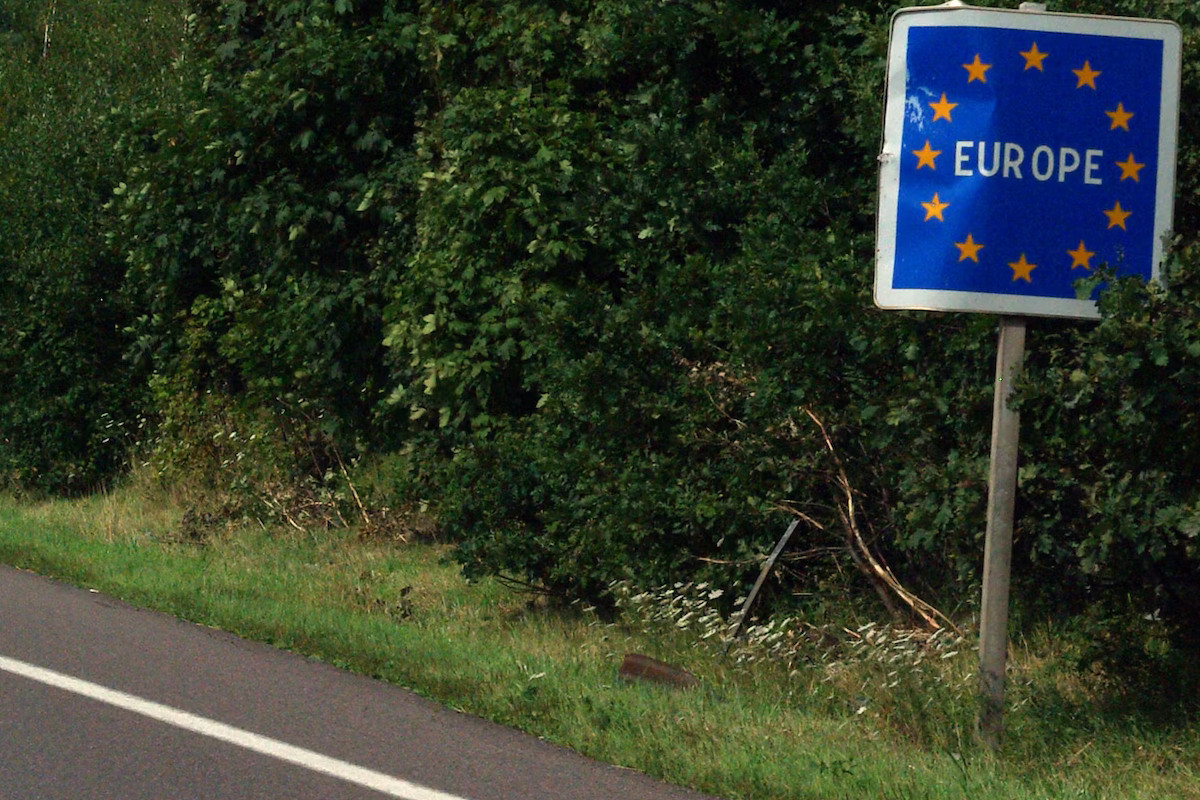The green police: anti-mafia powers for environmental crime investigations?
Topic
Country/Region
17 April 2023
The European Commission's proposal for a new environmental crime Directive will significantly strengthen law enforcement powers. As well as introducing a range of new criminal offences at EU level, the proposed Directive encourages the use of intrusive policing tactics against suspected environmental crime offenders. Member states, however, aim to water down the Commission’s proposal to reduce the obligations on national authorities, and are concerned about what they see as an attempt to ‘overharmonise’ national criminal laws.
Support our work: become a Friend of Statewatch from as little as £1/€1 per month.

Image: IAEA Imagebank, CC BY-NC-ND 2.0
Environmental crime: EU policing priority
According to Interpol and the United Nations Environment Programme, environmental crime is the fourth largest criminal activity in the world, growing at a rate between 5%-7% per year, and becoming increasingly profitable.[i] The European Commission argues that within the EU:
“Criminal activities related to the environment often have a cross-border dimension, while some environmental crimes usually impact several countries… or have cross-border effects… Cross-border cooperation between law enforcement and judicial authorities is therefore essential.”
However, environmental crime does not occur within a vacuum. The Sixth Assessment report by the IPCC unequivocally stated:
“Climate change is a threat to human well-being and planetary health (very high confidence). There is a rapidly closing window of opportunity to secure a liveable and sustainable future for all (very high confidence) … The choices and actions implemented in this decade will have impacts now and for thousands of years (high confidence).”
Explaining the need for action on environmental crime to combat climate change, the Executive Vice-President for the European Green Deal, Frans Timmermans, said:
“The willful destruction of our natural environment threatens our very survival as humanity. Letting law-breakers act with impunity undermines our collective efforts to protect nature and biodiversity, fight the climate crisis, reduce pollution, and eliminate waste.”[ii]
In 2021, the EU’s Justice and Home Affairs Agencies' Network committed to “continue fighting environmental crime,” as part of their commitment to the EU Green Deal. The Commission’s proposal for a reinforced Environmental Crime Directive is part of the same package of commitments.[iii]
2008 Directive and evaluation
The current Directive on the protection of the environmental through criminal law[iv] requires member states to impose criminal penalties for actions seriously harmful to the environment. For example, under the Directive, any conduct that causes significant habitat deterioration within a protected site is unlawful.
The European Commission evaluated the 2008 Directive in October 2020[v] and determined that it was ineffective. In the proposal for a new Directive,[vi] it concluded:
"The evaluation found considerable enforcement gaps in all Member States and at all levels of the enforcement chain (police, prosecution and criminal courts). It also identified deficiencies in the Member States regarding resources, specialised knowledge, awareness, prioritisation, cooperation and information sharing. It found no overarching national strategies to combat environmental crime involving all levels of the enforcement chain and a multidisciplinary approach. Moreover, the lack of coordination between administrative and criminal law enforcement and sanctioning often hinders effectiveness. It was also noted that the lack of reliable, accurate and complete statistical data on environmental crime proceedings in the Member States not only hampered the Commission's evaluation but also prevented national policy-makers and practitioners from monitoring the effectiveness of their measures." [emphasis added]
In December 2021 the Commission adopted a proposal for a new Environmental Crime Directive,[vii] alongside an array of other papers.[viii] The proposal can be broken down into four parts: updating (expanding) the list of environmental crimes; toughening sanctions; measures to strengthen the enforcement chain; and measures to monitor compliance by member states.
Many campaigners will no doubt welcome the introduction of new criminal offences and increased criminal sanctions. However, it is worth noting that the most damaging measures preventing the EU from achieving its Green Deal goals and sustainability targets are self-inflicted.[ix] The past year alone has seen backsliding on the Farm to Fork pesticide initiative,[x] and substantial involvement from fossil fuel giants shaping European energy policy.[xi] The focus on specific categories of organised crime circumvents serious questions on the structural role of the EU and its members in contributing to the environmental crisis through legislative inaction,[xii] something seemingly propelled by the member states seeking to protect industry and growth at the expense of environmental protection.[xiii]
New criminal offences: updating the list of environmental crimes
A total of 18 new categories of criminal offences are proposed by the Commission.[xiv] These are listed in Article 3 and include:
- illegal timber trade;
- illegal ship recycling;
- illegal water abstraction causing substantial damage to water resources;
- serious breaches of EU chemicals legislation causing significant damage to the environment or human health;
- placement on the market of products which, in breach of mandatory requirements, cause substantial damage to the environment or people's health because of the product's use on a larger scale;
- source discharge of polluting substances from ships;
- severe breaches of legislation on invasive alien species with Union concern;
- serious circumvention of requirements to get development consent and to do environmental impact assessment causing substantial damage; and
- serious breaches related to dealing with fluorinated greenhouse gases.
It should be noted, of course, that many activities – for example, the trade in timber, the abstraction of water, or pollution – may be environmentally devastating yet remain entirely legal.[xv] Whilst experts have called for no new fossil fuel developments in order to limit the effects of climate change, the European Commission’s 2021 infrastructure prioirty list supported 30 gas projects worth €13 billion.[xvi]
Article 4 of the Commission’s proposal also obliges member states to ensure that inciting, aiding and abetting, and intentionally attempting the commission of any of the criminal offences” is a criminal offence in itself. However, the Council of the EU wishes to exclude illegal property development “which causes or is likely to cause substantial damage to the quality of air, the quality of soil, to the status of water, or to animals or plants” from the scope of Article 4.[xvii]
The proposal also provides guidelines for specific criteria such as "substantial damage", "negligible quantity", and "likelihood to cause damage" with the aim of improving certainty in prosecutions.
Stepping up sanctions for offenders
Natural persons
The Commission proposes a maximum of 10 years’ imprisonment for a natural person if any of the offences “cause or are likely to cause death or serious injury to any person”. Where that is not the case, lower terms of imprisonment are proposed. Offenders would receive a sentence of at least six years in the case of:
(a) the discharge, emission or introduction of substances or materials ionising radiation;
(j) the manufacture, production, processing, handling, use, holding, storage, transport, import, export or disposal of radioactive material;
(n) the placing or making available on the Union market of illegally harvested timber or of timber products that were made of illegally harvested wood;
(q) production, placing on the market, import, export, use, emission or release of ozone depleting substances as defined in Article 3 (4) of Regulation (EC) No 1005/2009; and
(r) production, placing on the market, import, export, use, emission or release of fluorinated greenhouse gases as defined in Article 2 (1) of Regulation 517/2014 of the European Parliament and of the Council.
And at least four years in the case of:
(k) the abstraction of surface water or groundwater which causes or is likely to cause substantial damage to the ecological status or potential of surface water bodies or to the quantitative status of groundwater bodies;
(l) the killing, destruction, taking of, possession, sale or offering for sale of a specimen or specimens of wild fauna or flora species listed in Annexes IV;
(m) trading in specimens of wild fauna or flora species or parts or derivatives thereof listed in Annexes A and B to Council Regulation (EC) No 338/97;
(o) any conduct which causes the deterioration of a habitat within a protected site; and
(p) introduction or spread of invasive alien species of Union concern.
Other possible sanctions are also listed, including an obligation to reinstate the environment within a given period of time, fines, exclusions from public funding, the withdrawal of permits and authorisations, publication of judicial decisions relating to the sanction or conviction, and temporary bans on running for public or elected office.
The Council’s position again waters down the sanctions proposed by the Commission. Under the Council’s position, the 10-year term of imprisonment will only apply if offences cause death, rather than if they are likely to cause death or serious injury. Even when certain offences cause death, a much lower sanction applies. For instance, a maximum five-year term of imprisonment applies where death is caused by:
(a) the discharge, emission or introduction of a quantity of materials or substances or ionising radiation;
(b) the placing on the market, in breach of a prohibition or another requirement aimed at protecting the environment, of a product, the use of which results in the discharge, emission or introduction of a quantity of materials or substances or ionising radiation;
(e) the collection, transport, recovery or disposal of waste, the supervision of such operations and the after-care of disposal sites, including action taken as a dealer or a broker (waste management);
(i) the operation or closure of an installation in which a dangerous activity is carried out or in which dangerous substances are stored or used; and
(j) the manufacture, production, processing, handling, use, holding, storage, transport, import, export or disposal of radioactive material or substances.
The Council is also seeking the removal of additional sanctions proposed by the Commission. This includes the removal of temporary bans on the running for elected or public office, and the removal of the publication of judicial decisions as sanctions.
Legal persons
The Commission’s proposal states it will be possible for legal persons – principally, companies – to be held liable if the offences “have been committed for their benefit by any person who has a leading position within the legal person, acting either individually or as part of an organ of the legal person,” and assuming they are vested with decision-making or controlling powers. Legal persons may also be held liable for offences where the lack of supervision or control by such a person has made the commission of an offence possible.
The Commission’s proposal goes on to list possible sanctions for legal persons, including exclusion from entitlement to public benefits or aid, exclusion from access to public funding, placing under judicial supervision, the withdrawal of permits or authorisation to pursue activities which have resulted in the offence, and the obligation of companies to install due diligence schemes for enhancing compliance with environmental standards.
The Council has again watered down the sanctions proposed by the Commission, seeking the removal of the “obligation of companies to install due diligence schemes for enhancing compliance with environmental standards.” Nevertheless, the Council affirms clear maximum penalties of either 5% of the worldwide turnover of the legal person (or €40 million), or 3% of the worldwide turnover of the legal person (or €24 million).
However, there has been considerable unease among delegations regarding this article. The Finnish and Bulgarian delegations consider the proposal an "overly far-reaching and detailed harmonisation of criminal law,"[xviii] whilst the French delegation has called for member states to retain absolute discretion regarding the financial penalties applied.[xix] The Hungarian delegation has stated that they "doubt the proposed penalties… remain in the scope of minimum harmonisation" and has called upon the Council to reconsider its position in future negotiations.[xx]
Aggravating circumstances
The Council wants to significantly reduce the number of aggravating circumstances included in the Directive under Article 8. Consideration of aggravating factors enables judges to pronounce higher sentences to ensure that the level of sanctions imposed reflect the severity of the crime. Specifically, the Council seeks the removal of aggravating factors where the offence:
- “caused the death of, or serious injury to, a person”;
- “generated or was expected to generate substantial financial benefits, or avoided substantial expenses, directly or indirectly”; or
- “generated or was expected to generate substantial financial benefits, or avoided substantial expenses, directly or indirectly”.
The Council also wishes to exclude consideration of whether the offender “does not provide assistance to inspection and other enforcement authorities when legally required”, or “actively obstructs inspection, custom controls or investigation activities, or intimidates or interferes with witnesses or complainants”.
Shorter statute of limitations
The Council’s attempt to lower the level of criminal sanctions imposed similarly sees a proposal, in Article 11, for the lowering of the statute of limitations. For crimes punishable by a maximum sanction of three or five years imprisonment, the Council advocates for the reduction of the statute of limitations by one year compared to the Commission’s proposal. Nevertheless, the Council would permit derogation from the statute of limitations to enable member states to establish a limitation period shorter than 10 years, but not shorter than five, provided that the period may be interrupted or suspended in the event of specified acts.
Anti-mafia powers for investigating environmental crimes?
Article 18 of the Commission's proposal would oblige member states to "ensure that effective investigative tools, such as those used in organised crime or other serious crime cases," are available to investigate or prosecute environmental crime offences.
In paragraph 29 of the preamble to the proposed Directive, the Commission explains that these powers should include the ability to use tools including:
“…the interception of communications, covert surveillance including electronic surveillance, controlled deliveries, the monitoring of bank accounts and other financial investigation tools… Following national law, the nature and gravity of the offences under investigation should justify using these investigative tools."
The Council again wishes to water down the proposal – or at least make it less prescriptive – turning the Commission’s Article 18 into:
“Member States shall take the necessary measures to ensure that effective and proportionate investigative tools are available for investigating or prosecuting offences referred to in Articles 3 and 4. Where those offences are serious, special investigative tools, such as those used in countering organised crime, shall be available.”[xxi]
Alongside these proposals, the Commission stated that they would also seek to support the enforcement chain by "helping to develop tools and approaches that make the fight against environmental crime effective, for example, supporting the use of geospatial and artificial intelligence to collect and collate evidence of crimes such as illegal waste disposal and destruction of protected habitats."
Whistleblower protections
The Commission’s proposal seeks to provide strong protection for environmental crime whistleblowers. Article 13 states:
“Member States shall take the necessary measures to ensure that protection granted under Directive (EU) 2019/1937 [the Whistleblower Protection Directive], is applicable to persons reporting criminal offences referred to in Articles 3 and 4 of this Directive.”
However, the Council is seeking a more general obligation, that whistleblowers:
“…in accordance with their procedural rights under the national legal system, benefit from the necessary support and assistance measures in the context of criminal proceedings.”
Public participation
Article 15 of the Commission’s proposal could require the introduction of new legal measures for public participation in environmental crime proceedings, stating:
“Member States shall ensure that, in accordance with their national legal system, members of the public concerned have appropriate rights to participate in proceedings concerning offences referred to in Articles 3 and 4, for instance as a civil party”.
However, the Council is seeking to limit the grant of new procedural powers. Article 15 of the Council’s negotiating position states:
“Member States shall ensure that, the persons affected by the offences referred to in Articles 3 or 4 as well as non-governmental organisations promoting environmental protection and meeting requirements under national law have appropriate procedural rights in proceedings concerning offences referred to in Articles 3 and 4, where such procedural rights for the public concerned exist in the Member State in proceedings concerning other criminal offences.”
National strategies and monitoring compliance
Both the Council’s negotiating position and the Commission’s proposal contain an obligation for member states to establish and publish a national strategy for combating environmental crime. However, the Council wishes to remove the broad scope and high degree of specificity proposed by the Commission. The Council seeks to remove, in its entirety, the Commission’s proposal that the strategy at a minimum should address:
(a) the objectives and priorities of national policy in this area of offence;
(b) the roles and responsibilities of all the competent authorities involved in countering this type of offence;
(c) the modes of coordination and cooperation between the competent authorities;
(d) the use of administrative and civil law to address infringements related to the offences within the scope of this Directive;
(e) the resources needed and how specialisation of enforcement professionals will be supported;
(f) the procedures and mechanisms for regular monitoring and evaluation of the results achieved; and
(g) assistance of European networks working on matters directly relevant to combating environmental offences and related infringements.
The Commission’s proposal would oblige "Member States to collect and regularly report to the Commission statistical data related to environmental crime" alongside "an obligation on the Member States to collect and report statistical data according to harmonised common standards". Article 21 suggests that the data collected shall include the number of environmental crimes reported, investigated and successfully prosecuted; the length of the investigations; and the number of cases dismissed for specific offences. The types of penalties handed down should also be measured and shared. The Commission would then publish a report based on the statistical data transmitted by the member states every three years.
Once again seeking to reduce the obligations upon member states, the Council’s position advocates for a simplified and reduced category of data from member states pertaining only to the number of offences registered by member states, the number of natural and legal persons prosecuted and convicted, and the types and levels of sanctions imposed.
Secret negotiations
The Council’s position has been heavily criticised by NGOs. Patrizia Heidegger, Deputy Secretary General of the European Envirionmental Bureau, said in December:
“We are concerned about the low levels of ambition for the harmonisation of sanctions for companies. Environmental crime in Europe is steadily on the rise and small administrative fines have failed to stop this trend. Europe needs true criminal fines set at minimum levels of maximum sanctions of 15% of annual turnover for companies.”
The Council and Parliament are due to enter secret trilogues negotiations on the proposal shortly.
The negotiations occur in the backdrop of the recently released IPCC Sixth Assessment report, which reaffirmed the urgent need to protect the environment, and stated that:
“Effective climate action is enabled by political commitment, well-aligned multilevel governance, institutional frameworks, laws, policies and strategies and enhanced access to finance and technology. Clear goals, coordination across multiple policy domains, and inclusive governance processes facilitate effective climate action.”[xxii]
Greater environmental protections are required to safeguard the future of the planet. However, approaching ecological destruction as an extension of organised crime overlooks the structural role played by member states and the EU in the climate crisis. Whilst the directive may be a step in the right direction, it is unlikely that negotiations punctuated by attempts to limit obligations upon states will produce legislation meeting the scale of the threat posed.
Author: Chris Fuller
Notes
[i] UNEP-INTERPOL Rapid Response Assessment: The Rise of Environmental Crime – A Growing Threat To Natural Resources Peace, Development And Security, June 2016, https://www.unep.org/resources/report/rise-environmental-crime-growing-threat-natural-resources-peace-development-and
[ii] European Commission, ‘European Green Deal: Commission proposes to strengthen the protection of the environment through criminal law’, 15 December 2021, https://ireland.representation.ec.europa.eu/news-and-events/news/commission-proposes-strengthen-protection-environment-through-criminal-law-2021-12-15_en
[iii] European Commission, ‘European Green Deal: Commission proposes to strengthen the protection of the environment through criminal law’, 15 December 2021, https://ireland.representation.ec.europa.eu/news-and-events/news/commission-proposes-strengthen-protection-environment-through-criminal-law-2021-12-15_en
[iv] https://eur-lex.europa.eu/legal-content/EN/TXT/PDF/?uri=CELEX:32008L0099&from=EN
[v] 14065/19, https://www.eufje.org/images/docPDF/Study-on-the-implementation-of-Directive-2008_99_ENEC_SEO_BirdLife_May2016.pdf
[vi] https://eur-lex.euroa.eu/legal-content/EN/TXT/?uri=COM:2021:851:FIN
[vii] https://stopwildlifecrime.eu/wp-content/uploads/2022/08/Vita-Junke_DG-ENV_revision-and-proposal-for-a-new-ECD.pdf, https://ec.europa.eu/info/sites/default/file /1_1_179760_prop_dir_env_en.pdf
[viii] Namely, a communication (https://ec.europa.eu/info/files/communication-commission-european-parliament-and-council-stepping-fight-against-environmental-crime_en), summary guide (https://op.europa.eu/en/publication-detail/-/publication/ce99f624-5cc2-11ec-91ac-01aa75ed71a1), guidance document (https://op.europa.eu/en/publication-detail/-/publication/e004a9c9-596a-11ec-91ac-01aa75ed71a1), press release (https://ec.europa.eu/commission/presscorner/detail/en/ip_21_6744) and Q&A (https://ec.europa.eu/commission/presscorner/detail/en/qanda_21_6745).
[ix] https://corporateeurope.org/en/DeadlyClimateGamble
[x] https://corporateeurope.org/en/2022/12/not-so-soft-killing-eus-farm-fork-strategy
[xi] https://corporateeurope.org/en/2022/05/fossil-fuel-giants-shape-eus-response-energy-crisis
[xii] https://carbonmarketwatch.org/2022/11/30/eus-new-carbon-removal-framework-in-danger-of-camouflaging-climate-inaction/
[xiii] https://euobserver.com/opinion/156491; https://www.euractiv.com/section/energy-environment/news/banks-escape-eu-due-diligence-obligation-on-deforestation-again/
[xiv] https://ec.europa.eu/info/sites/default/files/1_5_179778_comm_env_en.pdf page 3
[xv] https://www.eea.europa.eu/publications/counting-the-costs-of-industrial-pollution
[xvi] https://www.clientearth.org/latest/press-office/press/environmental-groups-challenge-eu-support-for-30-fossil-gas-projects/
[xvii] https://www.consilium.europa.eu/en/documents-publications/public-register/public-register-search/results/?WordsInSubject=environment+criminal+law&WordsInText=&DocumentNumber=&InterinstitutionalFiles=&DocumentDateFrom=&DocumentDateTo=&MeetingDateFrom=&Mee
[xviii] 15006/22 ADD 3
[xix] 14827/22
[xx] 15006/22 ADD 4
[xxi] Article 13, https://data.consilium.europa.eu/doc/document/ST-16171-2022-INIT/en/pdf
[xxii] https://report.ipcc.ch/ar6syr/pdf/IPCC_AR6_SYR_SPM.pdf
Our work is only possible with your support.
Become a Friend of Statewatch from as little as £1/€1 per month.
Further reading
“Call them crazy”: Criminalisation of activists undermines rule of law in the EU
The Dutch police continue to disregard the rule of law to criminalise the pacifist activist Frank van der Linde. In recent years, his personal data has been sent to Europol, he has been labelled a terrorist, and police have suggested he be referred to a psychiatric facility. Far from an isolated case, van der Linde’s story shows just how far police in Europe will go to criminalise the right to protest and stifle political dissent.

The European Union and its crises
Since the Amsterdam Treaty of 1999, various crises have served as a pretext for expanding EU security structures and the powers of repressive authorities. Politically motivated human rights abuses remain the order of the day and have been exacerbated by the recent “migration crisis” at the EU's eastern borders.
Spotted an error? If you've spotted a problem with this page, just click once to let us know.

